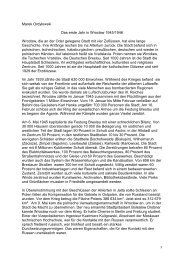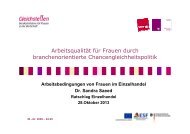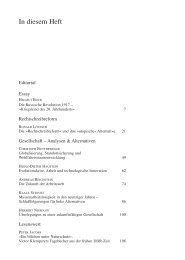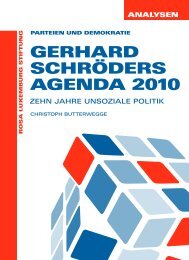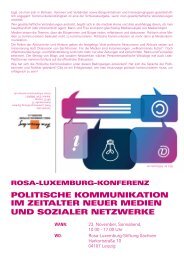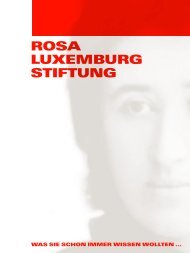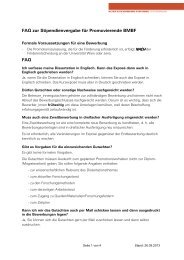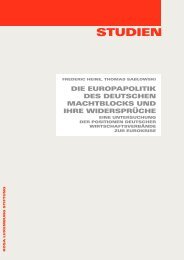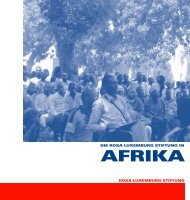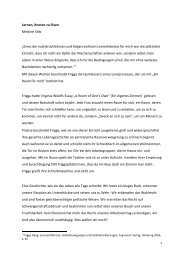The Left in Europe - Rosa-Luxemburg-Stiftung
The Left in Europe - Rosa-Luxemburg-Stiftung
The Left in Europe - Rosa-Luxemburg-Stiftung
Create successful ePaper yourself
Turn your PDF publications into a flip-book with our unique Google optimized e-Paper software.
<strong>The</strong> jo<strong>in</strong>t electoral success of 1999<br />
<strong>The</strong> national and <strong>Europe</strong>an elections of June 1999 were successful, but sober<strong>in</strong>g.<br />
With a result of 4.98 percent <strong>in</strong> the constituency South <strong>The</strong> <strong>Left</strong><br />
won a seat <strong>in</strong> the Luxembourg parliament. A peculiar feature of Luxembourg’s<br />
electoral system is that voters can accumulate and vote for several<br />
candidates from different lists at each political level (“panachage”). 14 André<br />
Hoffmann (NL) was elected on the basis of the number of votes he received<br />
personally. In October the same year local elections were held <strong>in</strong> which <strong>The</strong><br />
<strong>Left</strong> won six seats <strong>in</strong> five local authorities, <strong>in</strong>clud<strong>in</strong>g the country’s three<br />
largest cities: Luxembourg, Esch-sur-Alzette, and Differd<strong>in</strong>gen. When snap<br />
elections were called <strong>in</strong> Esch-sur-Alzette on 30 April 2000 <strong>The</strong> <strong>Left</strong> atta<strong>in</strong>ed<br />
12.8%, its best result to date, and its candidate, André Hoffmann,<br />
became deputy mayor. His place <strong>in</strong> the Luxembourg parliament was taken<br />
by KPL Chairman Aloyse Bisdorff.<br />
<strong>The</strong> second split of 2003<br />
<strong>Luxemburg</strong><br />
After these electoral successes the conflicts hitherto concealed by the<br />
shared electoral goals erupted <strong>in</strong> all their fury. Right from the start there<br />
had been disagreement about the character of the new organization, which<br />
had been papered over but not resolved by the term “collective movement”.<br />
While the majority of the KPL wanted to hold onto their own party, the<br />
New <strong>Left</strong> and RSP activists wanted more than just jo<strong>in</strong>t electoral lists. In<br />
practice this meant that the CP members <strong>in</strong> <strong>The</strong> <strong>Left</strong> canvassed for their<br />
own party and issued press releases <strong>in</strong> the name of the KPL, while the other<br />
members did the same for <strong>The</strong> <strong>Left</strong>. Fuel was added to the flames by the<br />
rotational pr<strong>in</strong>ciple, which <strong>in</strong> practice led to a lessen<strong>in</strong>g of Communist <strong>in</strong>fluence<br />
<strong>in</strong> parliament and the local authorities. <strong>The</strong>se differences came to a<br />
head at the Second Congress of <strong>The</strong> <strong>Left</strong> <strong>in</strong> October 2001, when for the<br />
first time as part of <strong>The</strong> <strong>Left</strong> the CP members appeared as a self-conta<strong>in</strong>ed<br />
group. F<strong>in</strong>ally the KPL made an offer to <strong>The</strong> <strong>Left</strong> not to contest the 2004<br />
elections with<strong>in</strong> the framework of the jo<strong>in</strong>t collective movement, but separately<br />
and on equal terms between <strong>Left</strong> and KPL. For most members of <strong>The</strong><br />
14 This means that citizens can vote for more than one candidate on their selected list and “delete” unwanted<br />
candidates. <strong>The</strong>y can also vote for candidates from different lists.<br />
36



